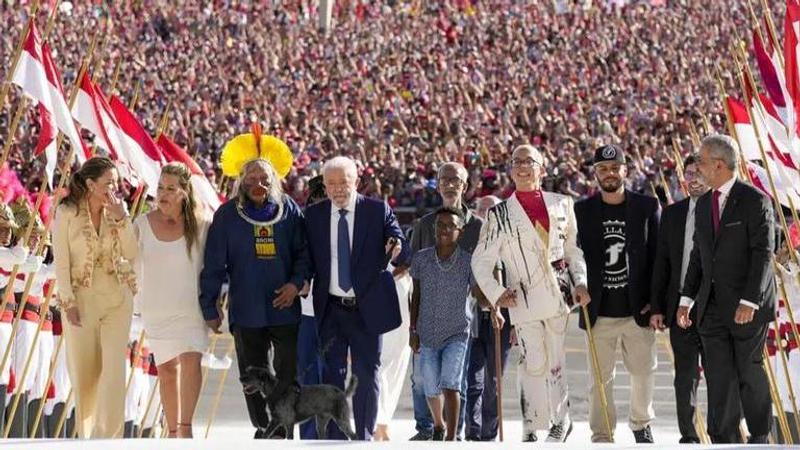Published 16:40 IST, January 3rd 2023
The challenges Brazil President Lula Da Silva faces as he takes over from Bolsonaro
As Lula Da Silva takes office for Latin America's largest country, he faces a darkening economic outlook with outgoing Bolsonaro leaving an isolated nation.

Left-wing politician Luiz Inacio Lula da Silva took over as Brazil President on the first day of the year signalling that he was ready to bring the Latin American country back to the international stage and contribute to the fight against climate change and rampant poverty. This is his third stint as the leader of the largest country in South America. Experts have said that this time, Lula's challenges are going to be very different from the time he took over in 2003 from then-President Fernando Henrique Cardoso who, as experts suggest, left a solid economic foundation for the country to build on.
Right-wing populist and outgoing head of state, Jair Bolsonaro, left behind deep budget holes and a complicated relationship with parliament, reported German outlet Deutsche Welle citing Carlos Melo, a political scientist at the Sao Paulo-based Insper Institute. President Lula will need to gather legislative support if he needs to make any change, especially with many vague areas of the budget which were used by former President Bolsonaro to appease lawmakers for their support. Lula has reportedly promised a completely transparent budget.
Lula 2003 vs Lula 2023
Twenty years ago, Lula was in the same position he is in now but the political climate in 2003 can not be compared to 2023. Lula, in his first presidency (2003) won the second round of elections with a 61 percent majority vote whereas, at the end of last year, he could garner only 50.9 per cent vote, pointing to the fact that the Brazilian public still remains highly divided. Lula had notably been in prison on corruption charges in 2018 and the majority of 2019. He was due to serve a 12-year sentence but was released in 580 days after a surprise ruling by the country's apex court annulled the sentence.
Bolsonaro supporters took to the streets daily, demanding military intervention against Lula's inauguration. One of the challenges Lula is facing is to get Bolsonaro supporters to largely accept him which will allow him to work in tandem with the legislative. "With under 2%, the outcome of the election was close, and now there are groups among the population who oppose him," reported DW citing Marco Antonio Carvalho Teixeira, a political scientist at the Fundacao Getulio Vargas (FGV) think tank, adding that that is something the new president will have to overcome quickly. Lula should form a government of national unity with a wide range of political movements, he said, adding that while Lula's Workers' Party (PT) dominated the government in 2003, he is now trying to integrate forces like the right-wing Uniao Brasil party.
Lula needs to quell protests quickly
"Brazil is currently experiencing an economic crisis that is worse than in 2002," the FGV's Teixeira told DW, conceding however that the economic situation has improved in recent months thanks to electoral gifts from the Bolsonaro government including pandemic aid and increased social benefits. They tore such deep holes in the budget that Lula needs parliamentary approval to suspend the debt brake and a majority for the necessary tax reform. "If Lula doesn't get broad political support now, he runs the risk of starting off with a crisis," experts suggest.
The Bolsonaro government's inaction contributed to the illegal protests. They deliberately turned a blind eye, DW reported. As soon as the new government restores order in the security apparatus, the protests will dwindle, he argued, adding that Lula will then have to deliver quickly and show success to reduce opposition to his government.
Lula's Climate Change stance at COP27
Soon after he won on October 30, 2022. President-elect Lula Da Silva took a trip to the Climate Conference COP27 Summit in Egypt signalling that he was back in the game. "Lula should specify how he plans to uphold the rule of law in the Amazon and protect both the forest and its defenders as soon as he takes office," said Maria Laura Canineu, Brazil director at Human Rights Watch, in the week after his October 30 victory on Twitter.
With his successful election campaign having included a promise to arrest record deforestation in the Amazon, Lula carried huge expectations into the yearly climate summit aimed at curbing planet-heating emissions. "The world is missing Brazil," said Lula in a speech at COP27 on Wednesday, adding that "Brazil is back." He stated his intention to set the nation on a path to "defeat deforestation and global warming."
Describing the "climate denialism" of outgoing president Jair Bolsonaro, Lula said the "survival of the Amazon forest" was on the line during the recent election. The Amazon is the world's largest tropical forest. It helps regulate climate and especially rainfall across the Americas, making it a vital source of water for those in the region. But nearly 20% has disappeared since 1970 through logging and burning. The massive carbon sink has even started to emit more carbon than it stores due to clearing, in part to make way for cattle and soy crops.
(with agency inputs)
Updated 16:40 IST, January 3rd 2023




